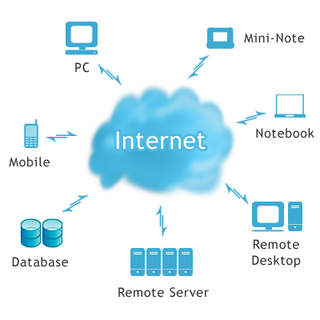Like many other industries, computers have revolutionized the accounting industry. No longer do accountants sit at a desk with a ledger, an adding machine and a pile of receipts. Computers and cloud-based accounting software have transformed the way accounting functions in an office and business environment.
Originally, accounting with computers was done on the desktop. Programs like Peachtree and Microsoft Excel brought calculations and accounting to personal computers. Intuit advanced the process with the Quicken and Quick Books line of software. The idea of cloud-based accounting, where the program and data are housed on a separate computer, started in the late 1990s with NetSuite. Later in the early 2000s New Zealand-based Xero developed a cloud-based accounting software system and established a large market share in Australia and New Zealand. Over time, traditional desktop accounting companies in the United States, like Intuit, saw the advantages of a cloud-based system and transitioned to the cloud.
Cloud-based accounting is versatile enough to enhance operations at both small and large businesses. Rather than having all of the information stored on someone’s desktop, the information is stored on a remote server. It can be accessed from anywhere with an Internet connection, because the software does not have to be installed on the machine, unlike traditional desktop software. The program usually runs on a standard web browser.
Real-time analysis
Cloud-based accounting offers the ability for anyone in a company to access the accounting data at anytime. The information does not have to be compiled and then emailed to people within the company. Skilled employees can run reports and analyze the data if they have the login information for the accounting software account. That allows management and senior leaders in the company to be able to get information and make decisions more quickly. They are not as reliant on another accounting staff member to provide the necessary information.
Security
Cloud-based computing is a secure way to access and store data. Security threats exist in both the desktop and cloud environments, because hackers take advantage of any vulnerability in a system. But the large networks that maintain cloud-based accounting software are continually monitored for intrusions, and often these systems are built with high security as the primary component. It may seem like a remote environment is not as secure as a desktop, but that is not necessarily the case. With a desktop system, like those stored on a laptop, the equipment can be lost, hacked or stolen. Cloud data is stored on a larger, remote network and the data is continually backed-up. Choose wisely when deciding what cloud-based software to use.
Get anytime access
With cloud-based accounting, the accounting team, senior management and other professionals such as CPA’s can access the accounting information anywhere, at anytime. If someone wants to log into the system from home, he or she is able to do that with a cloud-based system. The type of device doesn’t matter. The information can be accessed on a desktop, laptop, tablet or phone, because it is a browser-based program. The user just needs an Internet connection, and the login information for the account. This is a big time and cost saving revolution.
Improved client relationships
Cloud-based accounting can improve the relationship between an outsourced accounting team and a company. The company can access payroll, budgets and management reports through the Internet, and that process makes the accounting company’s work more transparent. Sharing the data and real time access improves the relationship and customer service and makes the services provided by the outsourced accounting company more valuable.
No installations or updates required
One of the biggest challenges with desktop accounting software is software updates. Companies continually make changes to software, and desktop users have to update the program. In the early days of software, this meant getting a new disk with the information. Now, a user can download the information over the Internet. Either way, it is a cumbersome process. With cloud-based accounting, the program is seamlessly updated. The browser loads the most current version every time the user logs into the program, and the user rarely even knows if updates have been made.
Document storage
Accounting is a document-heavy profession. Invoices, receipts, bank statements and other documents are a large part of any accounting activity. Those documents require huge amounts of storage capacity. Cloud-based accounting makes it easier to manage and store these documents. Documents can be scanned and stored in the cloud. That makes them easily accessible to anyone with the ability to use the accounting software. It makes document sharing easier, audits and research source documents an easier process. It also eliminates filing cabinets and storage units, which can save companies a ton of space.
Platform agnostic
Cloud-based accounting does not care if the user prefers an Android, PC or Apple-based operating system. The software runs off the web browser, and like any website, the browser adapts to the particular operating system. That makes sharing information easier, because there is no concerns about whether the program will run on a particular type of device.


